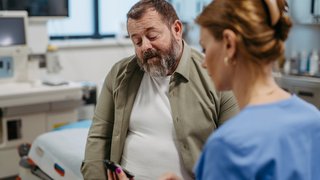Debunking the ‘miracle diet’ for cancer patients
June 3, 2015

A cancer diagnosis can be one of the most stressful events in a person’s life. Many patients feel like they have lost control of their bodies. To regain control, some patients look to miracle cures or diets. Much of the advice is well-intentioned, but sometimes these cures and diets are promoted by individuals or companies trying to take advantage of this vulnerable time in a cancer patient’s life.
Some of these products sold as cancer-killers include vitamin supplements, drink mixes, or special herbs. Often, these remedies have a history of being used for thousands of years in far-away countries to fight illness. Others are fads. These miracle cures do nothing for the patients except lighten their wallet.
There is no diet, superfood, vitamin, or drink that can cure cancer. Cancer is generally caused by multiple years of genetic damage to cells. This damage can be caused by environmental factors, including pollution, lifestyle choices, and often, genetic chance. Once cancer is diagnosed, no amount of kale or vitamins will make it go away. Even though some vitamins minimally reduce your risk of getting specific cancers, other vitamins can actually increase your chance of developing a cancer.
The focus needs to be on cancer prevention – eating right and taking care of yourself so that you don’t develop cancer. If you do happen to get cancer, follow your physicians’ advice about the best course of treatment.
What should I eat when I have cancer?
When a patient has been diagnosed with cancer, they often have an impulse to eat healthy foods and change their lifestyle choices. This is similar to heart patients who suddenly feel that a cheeseburger is not a good choice for lunch. If you have been diagnosed with cancer, by all means eat healthier. While eating healthy after a cancer diagnosis will not slow or reverse the growth of cancer, it can help you feel better during treatment as well as make your body stronger and more able to fight the disease.
At UT Southwestern, all cancer patients are referred to a cancer nutritionist. The nutritionist assesses each patient’s dietary needs during treatment. The nutritionist then recommends the best diet for the patients for their maximum health going forward.
Typically, we recommend diets low in fat and carbs and high in fresh vegetables and fruit. Eating more fish than red meat is advised, as well as eating smaller, more frequent meals. In some cases, where weight loss is expected during treatment, the nutritionist will recommend a high-calorie diet.
The truth is, eating is fun for everyone. So along with your healthy diet, we encourage people to enjoy some of their favorite treats. If you enjoy blueberry pie, have a slice now and then. One of the most common questions patients ask is if eating sugar will make their cancer grow faster, which is not true. Cancer cells can’t be starved, and they can use anything you eat. Even if you eat nothing, they will still steal energy from whatever is stored in your body.
Eat healthy always. Don’t smoke, stay out of the sun, and drink only in moderation. You’ve heard this advice a thousand times, but your actions now can help you avoid a cancer diagnosis. In the unfortunate event that you do get cancer, continue to follow a healthy lifestyle because your body will feel better and you’ll feel better about yourself, which are valuable tools you will need to fight the disease.
What can you do before and after a cancer diagnosis?
Join a gym! A good amount of physical activity (60 minutes daily) is associated with a lower risk for breast, colon and possibly other cancers. Exercise changes your body’s hormones and metabolism, which reduces cancer risk. Even after a cancer diagnosis, a doctor-approved exercise regimen actually improves the body’s ability to tolerate chemotherapy.
Lose weight! People who are overweight definitely get cancer more than those who successfully drop the pounds. Of course, it’s easier said than done, but definitely worth it. If I could convert the benefits of healthy weight loss into a pill, it would be one of strongest and best cancer treatments available!
Be very careful with supplements! Though I commonly use Vitamin A to prevent some cancers, this is after scientific research clearly showed it works. Some micronutrients like Vitamin E and selenium actually INCREASE your chance of getting prostate cancer. Before you decide to buy a supplement, be sure you read the side of the bottle where it will say, “This product is not intended to diagnose, treat, cure, or prevent any disease.”
Cancer research is constantly being done on supplements like vitamins, turmeric, and even broccoli sprout extract. Cancer doctors see their patients going through such difficult times. If there was ANY supplement we thought might help, we would be first to recommend or do research on it.










